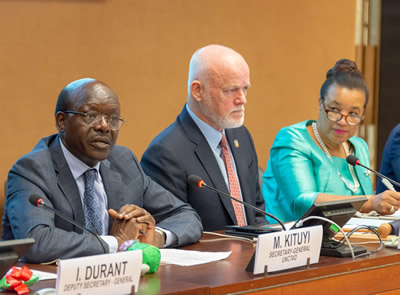Time is running out to find agreement on ending harmful fisheries subsidies by 2020 but a multi-agency push hosted by UNCTAD aims to inject momentum.
United Nations Oceans Envoy Peter Thomson welcomed participants to the Second Oceans Forum in Geneva on 16 July with a stark warning about the urgency of eliminating harmful fisheries subsidies by 2020 as laid out in the 2030 Agenda for Sustainable Development.
Mr. Thomson, who chaired the forum, was joined by UNCTAD Secretary-General Mukhisa Kituyi, Commonwealth Secretary-General Patricia Scotland, and senior officials from the Food and Agriculture Organization of the United Nations (FAO) and UN Environment, which co-sponsored the event with UNCTAD.
“The Oceans Forum is a unique global platform to take stock, exchange experiences and present options for the implementation of trade-related targets of Sustainable Development Goal 14, in particular targets 4, 6, 7 and b, through the involvement of leading United Nations Agencies, the Commonwealth, regional bodies, government institutions and civil society organizations,” Mr. Thomson said.
“Two of these targets that I have mentioned have got 2020 deadlines – we are talking a year-and-a-half – that’s targets 4 and 6, and there’s a clear linkage between them.”
Stay on target
Target 4 says that by 2020, UN member States must “effectively regulate harvesting and end overfishing, illegal, unreported and unregulated fishing and destructive fishing practices and implement science-based management plans, in order to restore fish stocks in the shortest time feasible, at least to levels that can produce maximum sustainable yield as determined by their biological characteristics”.
Target 6 says that we must, by 2020, “prohibit certain forms of fisheries subsidies which contribute to overcapacity and overfishing, eliminate subsidies that contribute to illegal, unreported and unregulated fishing and refrain from introducing new such subsidies, recognizing that appropriate and effective special and differential treatment for developing and least developed countries should be an integral part of the World Trade Organization fisheries subsidies negotiation”.
“One of the first things I did when the United Nations Secretary General appointed me Oceans Envoy last year,” Mr. Thomson said, “was to make arrangements to attend the WTO’s 11th Ministerial Conference in Buenos Aries in December 2017 because it was obvious to me that we cannot on the one hand say we strive to end overfishing and illegal, underreported and unregulated (IUU) fishing, and on the other continue to subsidize fisheries operations that encourage IUU fishing, overcapacity and overfishing – the two just don’t add up.”
Mr Thomson said that despite the failure of the WTO to settle the issue in Buenos Aires, there was a decision by WTO members to come to agreement no later than the next ministerial meeting in 2019.
“It is important we all show that we are determined to help the WTO reach this outcome. After all our leaders committed us to it in 2015,” Mr. Thomson said referring to the adoption of the 2030 Agenda and its goals by the United Nations General Assembly in September of that year.
“I trust that you share my view that we are all in this together and we must all be action-oriented.”
Fish to dish
The unsustainability of current fishing practices was becoming clear, Dr. Kituyi said.
“We need to introduce a fish-to-dish sustainability approach,” he said.
“From a trade perspective, fish-to-dish should focus on reducing tariffs, ending subsidies, and addressing non-tariff measures. Fisheries subsidies distort trade and fuel unfair competition between large fleets and artisanal fishermen and -women, fostering inequality. Estimated at about $20 million, harmful subsidies should be converted into investment into fisheries, aquaculture sustainability and coastal community livelihoods in order to reduce pressure on fish stocks.”
Holistic approach
Ms. Scotland said: “From the time that Sustainable Development Goal 14 on sustainable use of the oceans was agreed by the international community back in 2015, the Commonwealth has played a full part in convening support and developing thinking on its effective implementation.”
“The oceans economy is important for small island developing States, which I prefer to call big blue ocean States,” Ms. Scotland said. “For example, the Bahamas has an exclusive economic zone of over 600,000 kilometres, compared to a land area of 14,000. Kiribati comprises 33 islands with a total land area of only 800 square kilometres yet more than 3.5 million square kilometres of marine waters lie in its jurisdiction.”
The African, Caribbean and Pacific Group of States’ Viwanou Gnassounou, FAO’s Audun Lem, UN Environment’s Anja von Moltke and Nicola Koch of the United Nations Economic Commission for Europe also spoke at the opening session.
The International Ocean Institute’s honorary president Anwi Benham congratulated UNCTAD on its “holistic approach” to fish trade and biodiversity which promotes economic fairness without sacrificing sustainability.
Three Musketeers
Ms. Scotland earlier announced that Mr. Thomson, a former ambassador of Fiji to the United Nations, had agreed to serve as Oceans Envoy of the Commonwealth as well as the United Nations. Fiji is a member of the 53-nation body.
Speaking of herself, Mr. Thomson and Dr. Kituyi, she said she thought of the trio as the “Three Musketeers” of Oceans diplomacy. Underlining the multilateral and cross-disciplinary approach needed, Ms. Scotland repeated the motto of Alexandre Dumas’ heroes.
“All for one and one for all,” she said.
By the time of its conclusion, the two-day Oceans Forum was due to produce a negotiated action plan which will inform next steps toward achieving the trade-related aspects of Sustainable Development Goal 14, Mr. Thomson said.

